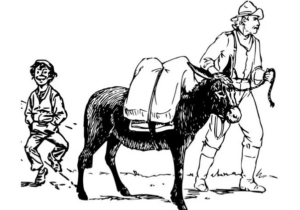
This story, ‘The old man, the boy and the donkey’ provides an exegesis on individual differences.
*The old man, the boy and the donkey:*
An old man and a boy were travelling from town to town in the company of a donkey. As they passed through the first town, they began to hear the murmur of people’s voices saying:
—What a pair of fools! They have a donkey and they walk along the road.
Hearing this, the old man felt bad and decided to pay attention to these words. So, he put the boy on the donkey and they continued their journey.
Arriving at the next village, the boy caught the attention of a peasant. Pointing at the travellers, he said:
—What an inconsiderate child! Being young and energetic, he allows the old man to walk and tire himself out.
The old man and the boy thought about it, so they decided to change places. While the boy walked and the old man rode the donkey, they reached the third village. There, people began to murmur:
—What an abusive, lazy, selfish old man! He drives the poor child tirelessly under the sun.
So the old man and the boy decided to ride the animal together and so they reached the fourth village. While there, a man approached them and said:
—Is that donkey yours?
“Yes,” the old man replied.
—Well, it doesn’t look like it, judging by the way you’re overloading and exhausting him. You should be the ones carrying the poor creature.
The old man and the boy sat down to think and it occurred to them to tie the donkey’s legs together, thread a stick between them and put it on their shoulders to carry the donkey.
The people were shocked to see such nonsense, so they followed the old man and the boy. When they reached the nearest bridge, the voices of the crowd began to disturb the donkey, who, using his strength, struggled and struggled with the ropes until he broke free and, unintentionally, fell down the bridge and fell into the river. The donkey recovered, swam out of the river and fled along the country roads.
Only then did the old man understand that, by wanting to please everyone, he acted without common sense and lost his most precious possession.
Moral
No matter how hard you try to please everyone, you will never succeed .
Explanation. In this famous traditional story, we can draw several reflections. On the one hand, we see how sometimes people talk too much, and tend to give their opinions on the lives of others without taking into account the reality of each person and their needs. Many of these people criticize or seek to give advice even though no one has asked for it, and they often confuse those affected.
On the other hand, the old man and the child represent those who are influenced by the opinions of others, without considering that there is no way to please everyone. There are as many points of view as there are people in the world. Therefore, this fable invites us to have common sense and our own criteria.





